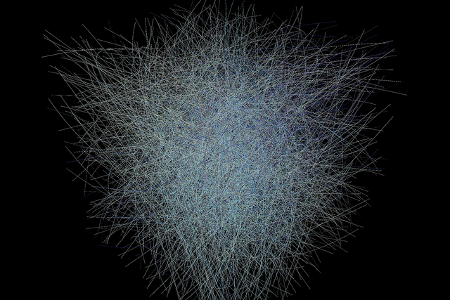Dear “Skeptics,” Bash Homeopathy and Bigfoot Less, Mammograms and War More by John Horgan.
Strings and multiverses can’t be experimentally detected. The theories aren’t falsifiable, which makes them pseudo-scientific, like astrology and Freudian psychoanalysis. Credit: parameter_bond/Flickr
The caption is from Horgan’s post. In case anyone asks, I retrieved and re-sized my own copy of the image.
From the post:
I hate preaching to the converted. If you were Buddhists, I’d bash Buddhism. But you’re skeptics, so I have to bash skepticism.
I’m a science journalist. I don’t celebrate science, I criticize it, because science needs critics more than cheerleaders. I point out gaps between scientific hype and reality. That keeps me busy, because, as you know, most peer-reviewed scientific claims are wrong.
So I’m a skeptic, but with a small S, not capital S. I don’t belong to skeptical societies. I don’t hang out with people who self-identify as capital-S Skeptics. Or Atheists. Or Rationalists.
When people like this get together, they become tribal. They pat each other on the back and tell each other how smart they are compared to those outside the tribe. But belonging to a tribe often makes you dumber.
Here’s an example involving two idols of Capital-S Skepticism: biologist Richard Dawkins and physicist Lawrence Krauss. Krauss recently wrote a book, A Universe from Nothing. He claims that physics is answering the old question, Why is there something rather than nothing?
Krauss’s book doesn’t come close to fulfilling the promise of its title, but Dawkins loved it. He writes in the book’s afterword: "If On the Origin of Species was biology’s deadliest blow to supernaturalism, we may come to see A Universe From Nothing as the equivalent from cosmology."
Just to be clear: Dawkins is comparing Lawrence Krauss to Charles Darwin. Why would Dawkins say something so foolish? Because he hates religion so much that it impairs his scientific judgment. He succumbs to what you might call “The Science Delusion.”
“The Science Delusion” is common among Capital-S Skeptics. You don’t apply your skepticism equally. You are extremely critical of belief in God, ghosts, heaven, ESP, astrology, homeopathy and Bigfoot. You also attack disbelief in global warming, vaccines and genetically modified food.
These beliefs and disbeliefs deserve criticism, but they are what I call “soft targets.” That’s because, for the most part, you’re bashing people outside your tribe, who ignore you. You end up preaching to the converted.
Meanwhile, you neglect what I call hard targets. These are dubious and even harmful claims promoted by major scientists and institutions. In the rest of this talk, I’ll give you examples of hard targets from physics, medicine and biology. I’ll wrap up with a rant about war, the hardest target of all.
…
To get the full flavor of what it means to be a skeptic, read this post and John’s accounts of the reactions to both his presentation and this post.
The “tell” of a target
Whether you are being skeptical of a popular (read “soft”) target like Bigfoot or skeptical of a “hard” target like psychiatric drugs, the reaction from believers is nearly universal: anger, denial and fairly rapidly, denunciation of yourself as unreasonable, etc.
Try being skeptical of a soft/hard target in your work.
Ask if there is racial bias in the algorithms you use day to day? Gender bias? If the answer is no, ask how do they know? Ask them to confirm it for you using data. What their hands closely during the demonstration.
After all, you are a data scientist and questions should be settled based on data and understanding the algorithms applied to them.
Yes?
Being a skeptic with a small “s” is a hard job. But your project, department, enterprise will be better for you being that skeptic.
Imagine one effective White House skeptic prior to the second war on Iraq. No $trillions spent, no countless lives lost, no instability in the region, etc. Skeptics with a small “s” can make all the difference in the world.
